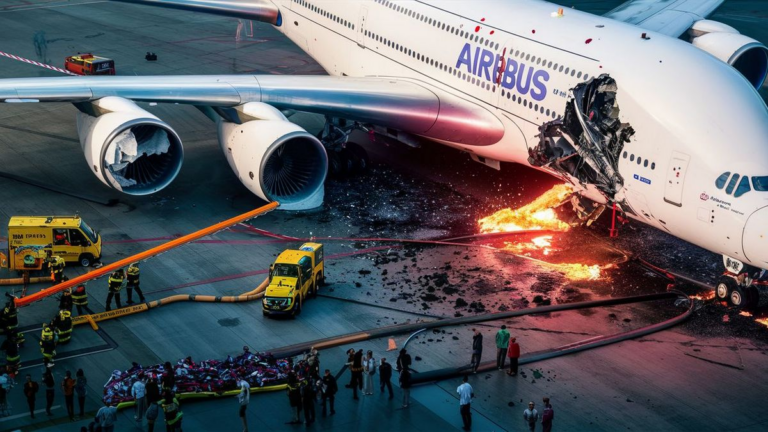Recently, the aviation world was shaken when an Airbus A380 experienced a rare and alarming engine failure incident in Singapore. This event, which unfolded with unexpected intensity, has prompted widespread discussions and concerns within the aviation community and among the general public.
The Incident
The Airbus A380, one of the world’s largest passenger aircraft, encountered a critical engine failure during its flight in Singapore. The specifics of the incident, including the exact nature of the failure and the flight details, are still under investigation by relevant aviation authorities.
Response and Investigation
Following the incident, aviation authorities in Singapore swiftly initiated an investigation to determine the root cause of the engine failure. Airbus, the aircraft manufacturer, is also actively cooperating with the investigation, providing technical expertise and support to ensure a comprehensive analysis.
This incident has prompted a collaborative effort among aviation experts, engineers, and regulatory bodies to uncover the underlying issues that led to the engine failure. The results of this investigation will play a crucial role in enhancing the safety measures and protocols across the aviation industry.
Implications for Airbus A380 Fleet
As the investigation progresses, concerns arise about the potential impact on the entire Airbus A380 fleet. Airlines operating these aircraft will closely monitor the findings and recommendations that emerge from the investigation to implement any necessary safety modifications or updates.
While it’s crucial to recognize the severity of this incident, it’s equally important to note that such occurrences are extremely rare in modern aviation. The industry’s commitment to safety remains unwavering, and incidents like these prompt continuous improvements and refinements in aircraft design and maintenance practices.
Ensuring Passenger Safety
Passenger safety is always the top priority in the aviation industry. Airlines and aircraft manufacturers adhere to rigorous safety standards, and incidents like engine failures are thoroughly analyzed to enhance safety protocols further. The incident in Singapore underscores the importance of constant vigilance and continuous improvement to ensure the safety of air travel.
The Airbus A380 engine failure in Singapore serves as a stark reminder of the complexities and challenges faced by the aviation industry. As investigations unfold, the industry will draw valuable lessons to bolster safety measures and prevent similar incidents in the future. The collaborative efforts of aviation authorities, aircraft manufacturers, and airlines reaffirm the commitment to passenger safety.
Frequently Asked Questions
While the Airbus A380 engine failure in Singapore has raised concerns and prompted investigations, it has also led to numerous questions from the public and aviation enthusiasts. Here are some frequently asked questions about the incident:
| Question | Answer |
|---|---|
| 1. What caused the engine failure? | The exact cause is still under investigation by aviation authorities and Airbus. Preliminary findings suggest a critical failure, but a detailed analysis is ongoing. |
| 2. How often do engine failures occur in large aircraft like the Airbus A380? | Engine failures of this magnitude are extremely rare in modern aviation. The industry maintains a high standard of safety, and incidents are thoroughly investigated to prevent recurrence. |
| 3. What measures are being taken to ensure the safety of the Airbus A380 fleet? | Airlines and Airbus are closely collaborating with aviation authorities to implement any necessary safety modifications based on the investigation’s findings. Regular maintenance and safety protocols continue to be a priority. |
| 4. How does the aviation industry learn from incidents like this? | Incidents prompt thorough analyses, leading to improvements in aircraft design, maintenance practices, and overall safety protocols. Lessons learned contribute to the ongoing enhancement of aviation safety. |
Ongoing Industry Collaboration
As the investigation progresses, it highlights the collaborative nature of the aviation industry. Engineers, regulatory bodies, and manufacturers are working together to ensure a comprehensive understanding of the incident, fostering a culture of transparency and continuous improvement.
Global Impact on Aviation Safety
While the incident primarily involves the Airbus A380, its implications extend globally. Lessons learned from this event will likely influence safety standards and procedures across various aircraft types, contributing to the overall advancement of aviation safety worldwide.
See also:






